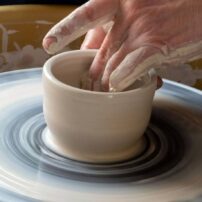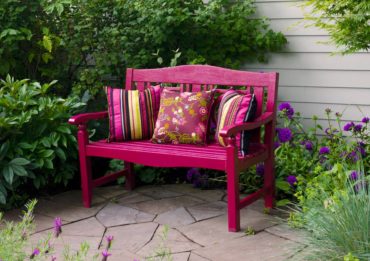 Have a seat, not just any seat. Be it a throne fit for a king or a lowly stool to plant the body down for a quick rest. A garden seat has many purposes in the garden. It comes in all shapes and sizes and is made from a variety of materials.
Have a seat, not just any seat. Be it a throne fit for a king or a lowly stool to plant the body down for a quick rest. A garden seat has many purposes in the garden. It comes in all shapes and sizes and is made from a variety of materials.
An artist wants a place to perch while painting a garden scene. When inspiration hits, a writer wants a comfortable wicker chair to sit for long hours under the shade of a maple tree in the garden. The busy executive wants to come home after a long day at work and comfort her body in an Adirondack chair with wide armrests for her iced drink. The classic porch swing conjures up thoughts of warm summer nights when families, friends or couples gather on the porch.
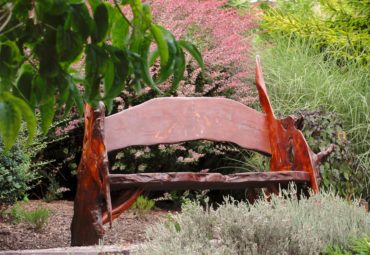 When it’s time to breathe in the aroma of flower fragrances drifting through the garden or find a place to listen to the outdoor world, what everyone needs in their garden is a comfortable place to sit.
When it’s time to breathe in the aroma of flower fragrances drifting through the garden or find a place to listen to the outdoor world, what everyone needs in their garden is a comfortable place to sit.
An outdoor chair can be strictly utilitarian or a work of art. Seating is not just about aesthetics, although some can stand in as an object of beauty and provide a comfortable place to sit. As focal points in the garden, chairs or benches provide a destination point or a place to sit and enjoy the views surrounding it.
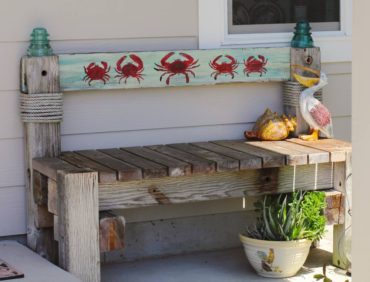 Distinguished architect and author of the book “Now I Sit Me Down,” Witold Rybczynski calls the monobloc or white plastic chair the first global seat because it’s inexpensively manmade. Plastic manufacturers all over the world produce these incredibly strong chairs that never degrade. Because they are used in all kinds of settings, when future archaeologists dig through the mountains of plastic discarded from our times, these chairs will be a testament to how we lived and relaxed during this era.
Distinguished architect and author of the book “Now I Sit Me Down,” Witold Rybczynski calls the monobloc or white plastic chair the first global seat because it’s inexpensively manmade. Plastic manufacturers all over the world produce these incredibly strong chairs that never degrade. Because they are used in all kinds of settings, when future archaeologists dig through the mountains of plastic discarded from our times, these chairs will be a testament to how we lived and relaxed during this era.
Rhode Island furniture maker John Dunnigan described furniture as being “really about the basic issue of human existence.”
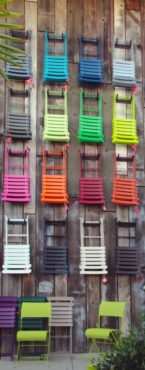 “It’s about how a person moves their body in space and how they interact with other objects. Furniture is about how the body sits on it or puts something on it,” Dunnigan says. “It would be the same for somebody living in 2000 A.D. or 2000 B.C.”
“It’s about how a person moves their body in space and how they interact with other objects. Furniture is about how the body sits on it or puts something on it,” Dunnigan says. “It would be the same for somebody living in 2000 A.D. or 2000 B.C.”
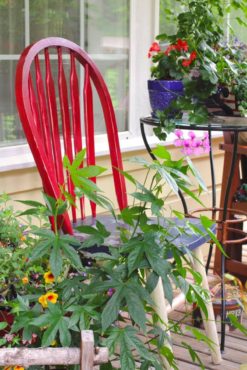 Outdoor seating is not a modern phenomenon. Early 15th century paintings depict courtyards with seating made from raised beds of soil. Builders framed the seats with materials such as brick, and planted groundcovers and scented herbs that gave a soft, textural turf to sit on.
Outdoor seating is not a modern phenomenon. Early 15th century paintings depict courtyards with seating made from raised beds of soil. Builders framed the seats with materials such as brick, and planted groundcovers and scented herbs that gave a soft, textural turf to sit on.
Wicker weave chairs are timeless. Five thousand years earlier, Egyptians weaved their wicker furniture from swamp grasses and reeds. However, it’s not about the materials used; wicker is a weaving technique using all types of matter. Today, furniture makers weave outdoor wicker with many durable materials that withstand the weather.
Egyptians also invented the classic x-frame folding stool. With many utilitarian uses, the same type of stools is built to this day.
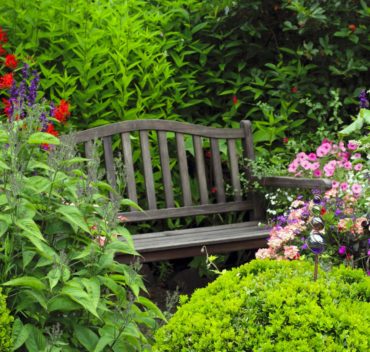 Almost everyone knows what a Windsor chair is. Originally designed as outdoor furniture, it was made popular by King George III after he sat on one at a commoner’s house. The seats were heavy enough that they didn’t blow over during a thunderstorm and the open-back design kept the king’s body cool. Impressed, he decided to have the chairs made for Windsor Castle, from which the chairs’ name came from.
Almost everyone knows what a Windsor chair is. Originally designed as outdoor furniture, it was made popular by King George III after he sat on one at a commoner’s house. The seats were heavy enough that they didn’t blow over during a thunderstorm and the open-back design kept the king’s body cool. Impressed, he decided to have the chairs made for Windsor Castle, from which the chairs’ name came from.
More recently, Thomas Lee invented the Adirondack chair in 1903. Wanting outdoor furniture for his family’s summer home, Lee built several prototype chairs and had his family test them. The chair we know today features his design with slanted back and wide arms that are used as mini tables for drinks.
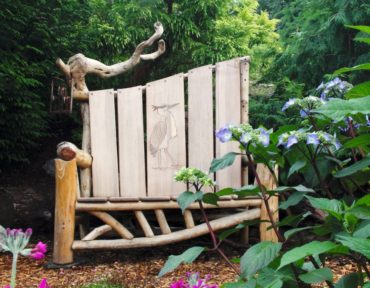 What Is Your Style?
What Is Your Style?
Some of the best gardens not only provide a place to sit down but homeowners are creative in how they seat themselves and their guests. Great seating makes a garden dynamic — once you sit down, you become a part of your surroundings.
Perhaps you fancy a “Game of Thrones” style of chair made up of broken tools you used to vanquish your weed enemies. Alternatively, you love wicker, cushions and many throw pillows. Not one size or style fits everyone. Whether you have the popular monobloc chair that’s popular worldwide or a simple bench to plop down upon, chairs tell a lot about your lifestyle.
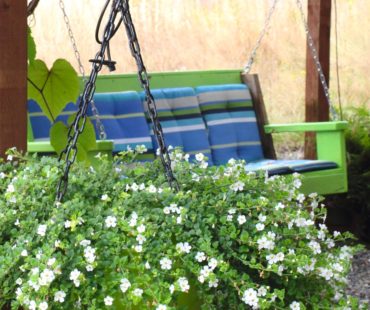 Choices of styles are endless, from Greek revival style utilizing klismos chairs fit for visiting emperors and Greek gods, to a bit of country with a comfortable set of rockers on the front porch for ma and pa.
Choices of styles are endless, from Greek revival style utilizing klismos chairs fit for visiting emperors and Greek gods, to a bit of country with a comfortable set of rockers on the front porch for ma and pa.
Marrying an unusual chair or bench to a garden complements its surroundings or provides an unexpectedly artistic or whimsical piece of furniture. Seating is a delightful way to raise the garden up from a dull space to an energetic one.
Even a no-nonsense gardener needs a place to sit down and take a break from the hard labor it takes to maintain a garden. Seating is for resting and relaxing. When a garden is created for enjoyment, places to sit down are important elements.
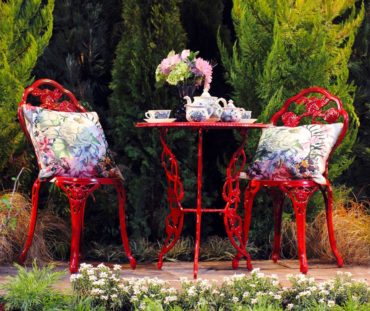 Winding through a garden with skinny trails is an invitation to rush through quickly. Wider paths and places to sit invite a visitor to be a part of the garden. A bench in the garden gives visitors an opportunity for quiet observation.
Winding through a garden with skinny trails is an invitation to rush through quickly. Wider paths and places to sit invite a visitor to be a part of the garden. A bench in the garden gives visitors an opportunity for quiet observation.
A homeowner wants a beautiful garden and an outdoor room that is warm and inviting. Good seating is an invitation to all who enter the garden to sit down and enjoy the spacious, blue-sky ceiling and a lovely garden. Add surround sound with bubbling water features or tinkling chimes. Nature provides the bird song. Then add the warmth of a propane firepot or fireplace into the space.
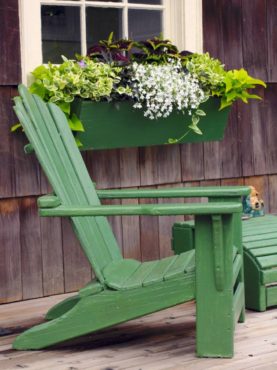 Benches and chairs add charm to otherwise dull spaces. Furniture may reflect a style; however, stepping away from a rigid style by including a hint of quirkiness or whimsy adds some fun to an outdoor room.
Benches and chairs add charm to otherwise dull spaces. Furniture may reflect a style; however, stepping away from a rigid style by including a hint of quirkiness or whimsy adds some fun to an outdoor room.
A beach cottage looks charming with driftwood made into a bench. Throw a few flagstones down at the base, a pot or two of plants surrounding it, and what once was a boring space to walk through becomes a satisfying destination in the garden. Furnish your outdoor room with a colorful umbrella; add friends, family and yourself — and the space instantly turns from ho-hum to fabulous.










